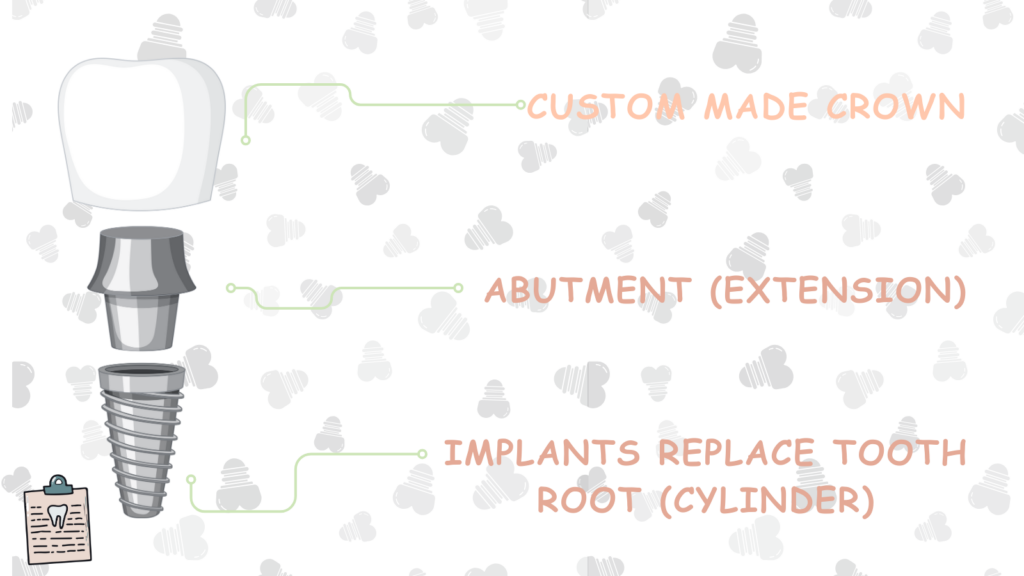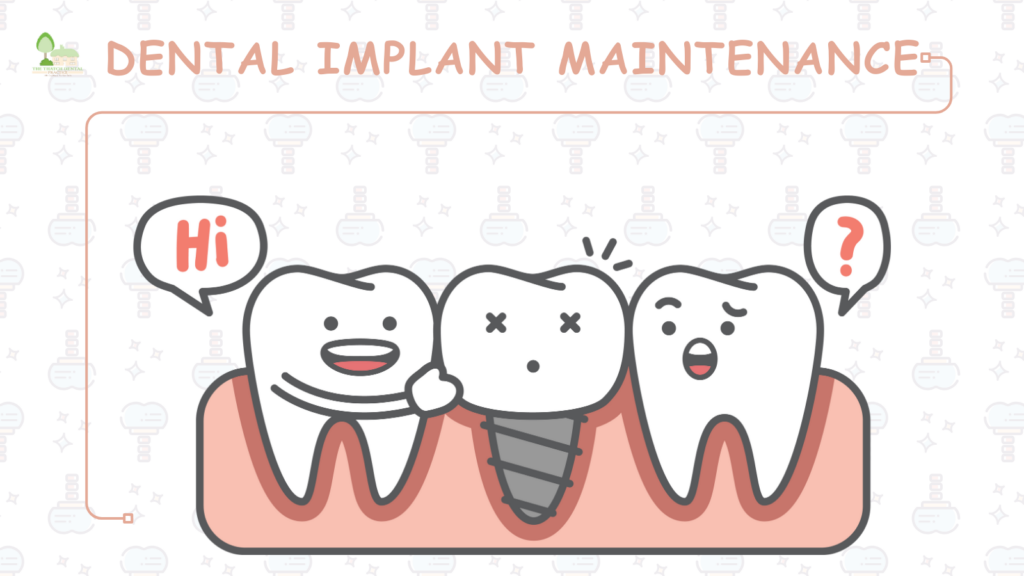What will you know in this
What is dental implant

A dental implant is a tiny screw made of titanium that acts as a tooth root. This is utilized to support one or more synthetic teeth, known as crowns.
Tooth loss resulting from trauma, decay, or gum disease can lead to wobbly teeth or problems with chewing. Dental implants are the permanent solution to these problems.
Here’s how it goes: The dentist surgically places the implant into the jaw bone. Over time the bone fuses around the implant making it stable and secure. This process, known as osseointegration, takes a few months to complete.
Once the implant is fully integrated with the bone a small connector or abutment is placed on top of it. This abutment holds the crown which is designed to look like a natural tooth.
Crowns are custom made to match the colour and shape of the surrounding teeth so it blends in with the smile.
Dental implants have many advantages. They are aesthetically and functionally similar to natural teeth.
You can eat your favourite foods without worrying about the implant coming loose which is a common problem with dentures.
Additionally implants help to maintain the jaw bone which can shrink if teeth are lost and not replaced.
This is important because a decrease in jaw bone can change the facial structure making a person look older.
However the process is long and involves surgery which may deter some. Not everyone is eligible for dental implants.
Candidacy depends on having healthy gums and enough bone in the jaw to support the implant. If the bone is insufficient a bone graft may be recommended to increase it before the implant.
Also individuals with certain medical conditions such as uncontrolled diabetes or heart disease may not be eligible for implants.
A dental implant is a long term investment in your oral health. With good oral hygiene and regular dental visits they can last for decades or even a lifetime.
Although the initial cost of implants is higher than dentures or bridges the durability and natural look justifies the investment over time.
In short a dental implant is a strong permanent solution to replace a lost tooth that looks and feels natural and functions the same way.
This is an excellent choice for individuals seeking a long-term fix for missing teeth, but it necessitates patience and robust general health.
How does a dental implant work

A dental implant is like a little hero for a missing tooth! It’s a small post, often made of metal, that goes into your jawbone where the tooth used to hang out. Think of it the root of your new tooth, giving it a strong and steady base.
Over time, your jawbone grows around this post in a cool process called osseointegration. It makes the implant feel just like a regular tooth root would.
Once everything’s snug and secure, the dentist pops on something called an abutment on top of the implant. This piece connects the implant to an artificial tooth, or crown.
The crown is specially made to match your other teeth’s color, shape, and size.
When that crown’s in place, the gap in your smile fills up! Your smile looks awesome again, and you can bite and chew like before.
Getting a dental implant can take some time because it’s a bit complex. First off, you’ll have an appointment where the dentist checks how healthy your mouth is to see if you’re ready for this journey.
If your jawbone isn’t strong enough, don’t worry! They might suggest a bone graft to give it some extra support. After placing the implant, there’s a healing period—this could be several months long—so the jawbone can really stick to that implant.
After healing up, you’re almost done! The dentist will add the abutment and then the crown. Dental implants work just like real teeth! They help you chew better, talk more clearly, & keep your mouth healthy overall.
Unlike dentures, which can wiggle around sometimes, implants stay put! With good care, they’re set to last for many years—or even forever!
So yeah, dental implants are pretty amazing for filling in those missing spots in your smile! They start with putting in that sturdy little metal post in your jawbone.
Then comes all that healing and bonding time before fitting on your custom-made crown. Even though it takes some patience, you end up with a strong and natural-looking smile that can really brighten up your day!
Do dental implants require special care or cleaning?
Caring for dental implants is not much harder than your natural teeth. After placement clean the implant area twice a day with a toothbrush and floss once a day to keep it clean.
Regular appointments with your dentist are important for them to check on your gums and the implant.
Although implants are durable and meant to last long term, proper oral care is key to preventing gum disease which can affect the success of the implant.
In some cases your dentist may recommend using specialized tools like an interdental brush for hard to get to areas. But generally dental implant care is the same as natural teeth.
Maintaining a consistent oral hygiene regimen of brushing, flossing, and dental examinations can aid in preserving the health and longevity of your dental implants.
What is dental implant maintenance?

Take care of your implants and they will endure. Like natural teeth, they need to be cleaned daily. Brush and floss every day to get all food and plaque out of the implant area.
Regular dental appointments are also important. At these appointments your dentist will clean your implants and check for any problems, such as gum swelling or implant movement.
Choose the suitable tools. Use toothbrushes with soft bristles and gentle toothpaste to protect the surface of the implant. Water flossers and special dental brushes can help get into the hard to reach areas. Avoid hard or chewy foods like ice or caramel to damage the implants.
By following good oral hygiene and regular dental visits you can keep your implants healthy. Maintenance is the key to preventing infections, gum disease or implant failure so your dental implants will last for years to come.
Dental Implant Maintenance and After care
Taking care of your implants after they are placed is key to their health and durability. Treat your implants like your natural teeth. Brush your teeth with a soft toothbrush and floss or use interdental brushes to keep plaque away from the implant. Avoid hard or chewy foods that can harm the implant or the gum around it.
Attending your dental appointments is absolutely essential. Your dentist will check the implant to make sure it’s stable and your gum is healthy. Professional cleanings will also help in the overall health of your implants.
Watch out for any pain, swelling or changes in the feeling of the implant. If you see anything unusual, contact your dentist immediately. Quit smoking if you are a smoker as it can hinder the healing process.
How Long Do Dental Implants Last?
Dental implants are designed to provide a durable solution for lost teeth. On average, they can last 20 to 30 years or even longer with the right care. In many cases, they can even last a lifetime.
Dental implants’ durability is attributed to the materials they’re made from, such as titanium, which is both strong and adaptable to the body, allowing it to fuse with the jawbone.
This fusion, known as osseointegration, establishes a solid foundation for the artificial tooth or crown attached to the implant.
The longevity of a dental implant is affected by several factors. Primarily, maintaining good oral health is important.
Regular brushing, flossing, and visiting the dentist are essential to prevent gum disease or infections that can weaken the implant over time.
Smoking and excessive alcohol consumption can also reduce the lifespan of an implant by interfering with the healing process and overall oral health.
The position of the implant within the mouth also plays a role. Implants located in the back, where chewing forces are greater, may wear out more quickly than those in the front.
In addition, the health of the bone and gums surrounding the implant is important. A strong, healthy jawbone and gums increase the likelihood of implants lasting longer.
In certain circumstances, the crown or synthetic tooth attached to the implant might require replacement every 10 to 15 years because of regular wear and tear. However, this does not mean the implant itself needs to be replaced. Thanks to improvements in dental materials and technology, implants have grown increasingly robust and dependable over the years.
To extend the life of your dental implant, it is important to follow your dentist’s care guidelines. Keeping up with proper dental care, avoiding hard or sticky foods, and going for routine dental check-ups can aid in keeping implants in optimal condition for a long duration.
Although nothing lasts forever, dental implants are recognized as a dependable choice for a long-term solution to missing teeth, providing both robustness and the possibility for lifelong usage.
How much are dental implants?

The price of dental implants can differ based on various elements. A single dental implant placement costs £2,350.
The price of full-mouth implants or All-on-4 can be determined after the initial consultation at The Thatch Dental Practice. The initial consultation fee is £150.
This price includes the implant, the abutment (a connector piece), and the crown (the artificial tooth that mimics a natural one).
However, the cost may escalate if extra procedures are necessary, like bone grafts or sinus lifts, which get the jawbone ready for the implant. The dentist’s skill level and the dental clinic’s location also play a role in determining the cost.
In metropolitan areas, the expenses might be higher due to increased living expenses, whereas in smaller communities, the rates could be slightly more affordable..
It’s also worth mentioning that dental insurance usually doesn’t cover implants, as they are often seen as cosmetic treatments.
However, some insurance plans might cover a part of the cost, particularly if the procedure is medically necessary.
Additionally, dental offices often offer financing options, allowing patients to pay in smaller, manageable payments.
In conclusion, while dental implants represent a significant financial commitment, they provide a lasting solution for missing teeth.
The price varies based on your individual needs and the location of the dental office, but many individuals find the benefits, including durability and a natural look, to be well worth the investment.
Are dental implant safe
Dental implants are usually pretty safe for most folks. But, just like any medical, they do have some. So, what’s a dental implant? Well, it’s a little screw—often made from titanium—that goes into your jawbone to hold a fake tooth or bridge in place.
This way of fixing teeth has been around for quite a while and works really well with more than 95% success! Still, not’s a perfect fit for this kind of procedure.
To make sure implants work right, you need to have healthy gums & enough bone in your jaw to hold the implant steady. If those things aren’t there, it might not be super stable.
People with issues like diabetes, gum disease, or who smoke might run into extra challenges. Smoking can slow down healing, which could lead to problems down the line.
If an implant doesn’t link up with the bone like it should, it can hurt or feel uncomfortable. In very rare cases, it might even need to get taken out.
A big worry for many is getting an infection. After the implant goes in, there’s a chance of infection where the implant is placed. But usually, antibiotics can help with that, though it’s good to keep a close eye on things.
There are other possible problems too—like nerve damage—especially if the implant is too close to a nerve in your jaw. This could lead to numbness or pain nearby, but don’t worry; it doesn’t happen often.
Still, even with these risks, dental implants are seen as a safe and trustworthy way to replace teeth that are missing.
Technology has come a long way! New techniques mean fewer complications now.
Most dentists take careful steps—like using X-rays or 3D images—to plan exactly where to put the implant so problems are less likely.
You should also read these
- What is Composite Bonding Teeth?
- Wisdom Teeth Removal
- How to Prevent Periodontal Disease
- Teeth Whitening in bury st edmunds
- Gum Disease Treatment
- Palateless Denture Cost
- Dental Bridge Cost in Bury St Edmunds
- Dental Implants in Lakenheath
- Tricare in Lakenheath
- Are dental implants painful
- How to Clean Invisalign Retainers : A Comprehensive Guide
- How Does Invisalign Work







